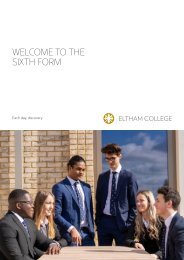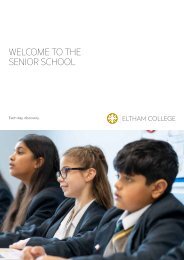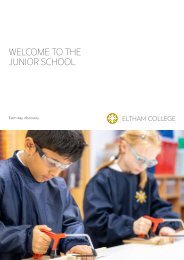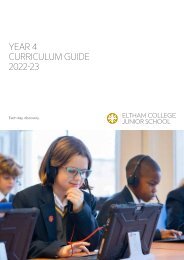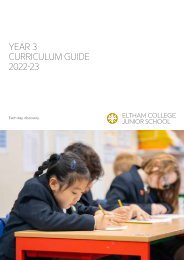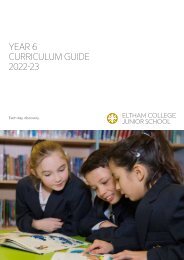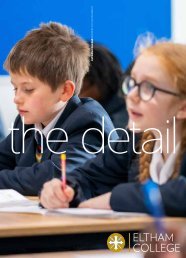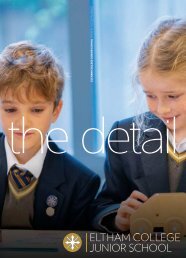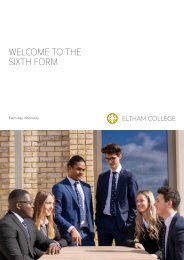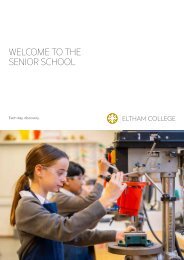JS Curriculum Guide - Year 5 - 2022-23
You also want an ePaper? Increase the reach of your titles
YUMPU automatically turns print PDFs into web optimized ePapers that Google loves.
English<br />
Reading<br />
Developing confident and motivated readers is a core aim of<br />
English teaching at Eltham College Junior School. The staff and<br />
students share a common love of books and there is a real<br />
culture of reading here. The English curriculum is constantly<br />
evolving, building on its rigorous traditional foundations to create<br />
a cohesive, challenging and up-to-date programme of teaching<br />
and learning with great books at its centre.<br />
Though we expect students to be free readers, teachers are on<br />
hand to guide them to the correct choice of books for their level.<br />
We hear students read on a regular basis as part of classroom<br />
activities and we give extra help where possible.<br />
Students should also be reading every evening at home. Regular<br />
reading aloud helps to develop fluency, comprehension and<br />
expression. We ask that parents assist by reading to and with<br />
their children, listening to them reading aloud, and completing<br />
the reading diary appropriately. Students should also be<br />
encouraged to read silently at home for their own enjoyment.<br />
The library is available at lunchtimes and the use of public<br />
libraries is encouraged.<br />
Comprehension will develop through dialogue, as well as more<br />
formal methods, and fortnightly Let’s Think in English lessons.<br />
LTE, already being used successfully in the Senior School, is a<br />
research-based, cognitive acceleration programme developed at<br />
King’s College, London. It is designed to systematically develop<br />
students’ skills of inference, deduction and analysis and by<br />
introducing the programme at Key Stage 2, we will ensure that<br />
students at EC<strong>JS</strong> are best-placed to meet the challenges of the<br />
Senior School English <strong>Curriculum</strong>.<br />
Writing<br />
Whether they have ambitions to be the next J.K.Rowling, to write<br />
speeches for presidents, or to pen prize-winning theses, the<br />
students’ skills with language will play a crucial role in their future<br />
careers. But good writing doesn’t just come out of nowhere.<br />
Writers of all kinds start their training as prolific and voracious<br />
readers and it is from engagement with high-quality texts that the<br />
students will develop their skills.<br />
They will study a wide range of contemporary and classic texts, as<br />
well as non-fiction, poetry and film. Grammar is explicitly taught,<br />
but it is also embedded within the context of the text being<br />
studied, feeding logically and seamlessly into the students’<br />
creative writing.<br />
Creative writing will be taught through the texts being studied, and<br />
students will be encouraged to proofread, edit and revise their own<br />
work and give feedback to their peers. The students will have clear<br />
models to emulate and a strong purpose for their writing, be it<br />
blogging, performance poetry, or a short story competition.<br />
Spelling<br />
A new online spelling scheme, with practice and application at its<br />
centre, has recently been introduced, and the students will begin<br />
to see the benefits of being taught how to apply learned rules to<br />
unfamiliar words. The students are encouraged to learn words<br />
that follow a particular spelling pattern, but their progress will be<br />
assessed with a weekly dictation exercise, testing application<br />
rather than rote learning.<br />
Handwriting<br />
This is taught using the Collins Handwriting Scheme, which<br />
encourages starting all letters from the line. Correct formation of<br />
letters is taught from <strong>Year</strong> 3, and ‘joined-up’ or cursive writing is<br />
expected in <strong>Year</strong>s 4, 5 and 6. Students in <strong>Year</strong> 5 are expected to<br />
use pen for their written work.<br />
Verbal Reasoning<br />
A range of question types and methods is explored weekly.<br />
Presentation of Written Work<br />
From entry to the Junior School students will be instructed how<br />
to present their work in their books.<br />
The following guidelines must be followed;<br />
• All students will write in blue ink pen<br />
• Setting out sheets are glued into the front cover of all<br />
students’ books at the start of the school year, in order for<br />
children to understand how their work should be presented<br />
• The date needs to be written on the left hand side of the<br />
page e.g. Monday 13th March and underlined using blue ink<br />
with a ruler<br />
• We expect no graffiti on exercise books, and a high level of<br />
presentation at all times<br />
The following setting out sheet is used as a guide:<br />
This area at the top of the page is not a space to write<br />
in as it has no top line<br />
Tuesday 5th September<br />
‘Title’ or ‘Unit of Work’<br />
1. Start your work here...<br />
2. Miss a line after each answer





